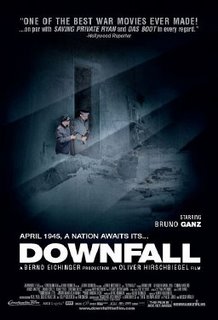Downfall
For the past year or so, I have been writing film and TV reviews at DVDFanatic.com. Here are synopsis' and links to those reviews.

What an act of bravery it was to make Downfall. Had this film been produced within the Hollywood juggernaut, that sentiment would be moot. Ambitious, but hardly brave. That Downfall was made by Germans makes it brave.
When discussing the Second World War, pride in the “greatest generation” still moves the hearts of Americans, as does humiliation and remorse in Germans. In a country that would much rather ignore and forget, Downfall stands as a stark and blinding reminder of the sins of its soiled past.
Downfall dwells on the final days of the Third Reich, a time of utter hopelessness supercharged with mad desperation and fantastical optimism. The Russians have swallowed Berlin and now march their way to the city’s center where Adolf Hitler and his generals cower in an underground bunker. As Berlin disintegrates around him, Hitler presides over obsolete maps, rearranging imaginary armies in a delusional belief that victory can yet be snatched from the jaws of defeat. Ultimately, even he will realize the futility of his situation and splatter his brains across the walls of his personal study.
Critics have sung Downfall’s praises, and the film has won several prominent awards within Germany, as well as being nominated for Best Foreign Language Film at last year’s Academy Awards. Still, not all the press has been favorable. Many have blasted Downfall for humanizing Hitler. By making him just a man, they say, you lessen his unimaginable crimes. By showing Eva Braun and her unshakable love for history’s greatest tyrant, you validate the idea that he had aspects that were, in fact, lovable. However, while humanizing the architect of Nazi Germany’s gore-soaked grab for world domination was indeed the aim of the film, excusing his culpability was not.
Downfall refuses to deal in cardboard stereotypes, even those that are rooted in historical fact. If Hitler is denied a common humanity, he becomes something other, something alien. If he remains in the realm of the monstrous, we cannot truly identify with him, we cannot realize that we too are capable of such evils, that the evils he fueled could happen again. He is even more of a monster precisely because he is human.
To read the full review, click here.

What an act of bravery it was to make Downfall. Had this film been produced within the Hollywood juggernaut, that sentiment would be moot. Ambitious, but hardly brave. That Downfall was made by Germans makes it brave.
When discussing the Second World War, pride in the “greatest generation” still moves the hearts of Americans, as does humiliation and remorse in Germans. In a country that would much rather ignore and forget, Downfall stands as a stark and blinding reminder of the sins of its soiled past.
Downfall dwells on the final days of the Third Reich, a time of utter hopelessness supercharged with mad desperation and fantastical optimism. The Russians have swallowed Berlin and now march their way to the city’s center where Adolf Hitler and his generals cower in an underground bunker. As Berlin disintegrates around him, Hitler presides over obsolete maps, rearranging imaginary armies in a delusional belief that victory can yet be snatched from the jaws of defeat. Ultimately, even he will realize the futility of his situation and splatter his brains across the walls of his personal study.
Critics have sung Downfall’s praises, and the film has won several prominent awards within Germany, as well as being nominated for Best Foreign Language Film at last year’s Academy Awards. Still, not all the press has been favorable. Many have blasted Downfall for humanizing Hitler. By making him just a man, they say, you lessen his unimaginable crimes. By showing Eva Braun and her unshakable love for history’s greatest tyrant, you validate the idea that he had aspects that were, in fact, lovable. However, while humanizing the architect of Nazi Germany’s gore-soaked grab for world domination was indeed the aim of the film, excusing his culpability was not.
Downfall refuses to deal in cardboard stereotypes, even those that are rooted in historical fact. If Hitler is denied a common humanity, he becomes something other, something alien. If he remains in the realm of the monstrous, we cannot truly identify with him, we cannot realize that we too are capable of such evils, that the evils he fueled could happen again. He is even more of a monster precisely because he is human.
To read the full review, click here.


1 Comments:
An excellent DVD and film, one that was painstakingly crafted. This Bruno guy held me in absolute thrall. I know its cliched to say one is forgetting that one is watching an actor play a part, but in this case it was true. Within a half hour I had forgotten that I wasn't really watching Hitler on screen. That's the god's honest truth.
One more note: The secretary is interviewed extensively on my World at War dvd box set. 30 years older than the events of that time, and 30 years younger than she appears on Downfall. That boxed set is one of my favorite material things.
Post a Comment
<< Home